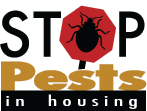Focus Units and IPM Coordinators
Allocate time and resources to focus units, where residents are hindering pest management because of poor housekeeping practices. IPM coordinators keep tabs on focus units until infestations and underlying issues are solved.
Focus Unit List
- The property manager and the contractor compile a list of focus units based on staff feedback and inspection results. If at any time a resident complains of an infestation (through the work order system or directly to management), his or her unit will be added to the focus unit list.
- Schedule frequent pest inspections and monitoring in focus units. The IPM coordinator visits each unit to assess whether outside support services or legal action is needed. The PMP treats (with pesticides and/or nonchemical methods), makes recommendations, and follows up until the infestation is gone.
IPM Coordinators
The IPM coordinator is an on-site person who strategizes pest management efforts in a focus unit. PHAs have successfully used different people for this role. The IPM coordinator may be a hired resident, maintenance technician, inspector, in-house PMP, or property manager. The IPM coordinator typically helps the technician to access apartments and common areas, deliver notifications and preparation instructions to residents, and follow up with residents and staff in pest-conducive areas between the PMP’s visits. The Boston Housing Authority uses resident IPM coordinators at each property. See our IPM Coordinator Position Description.
Suggested procedure for working in a focus unit
Visit 1: Assessment and information-sharing
- IPM coordinator notified of a focus unit.
- IPM coordinator researches the unit: previous pest control attempts, reports from the contractor, and any other considerations.
- IPM coordinator meets with the resident in the unit and
- explains the IPM program to residents;
- explains importance of sanitation and clutter removal for discouraging pests;
- discusses health risks and problems associated with pesticide use;
- gives educational materials to the resident;
- visually inspects the home with the resident and points out problem areas, including food and water sources for insects in each room;
- places at least six monitors (under sink, by stove, behind refrigerator, living room, bathroom, bedroom) and records where the monitors are placed on a floor plan;
- shows residents how to place a work order and places work orders if needed;
- discusses the next PMP visit and the importance of preparation for the visit;
- demonstrates the use of the HEPA-vacuum cleaner to remove pests and reminds the residents that leaving dead pests around the home may trigger asthma symptoms; and
- schedules the next visit and lets the resident know what he or she will have to do to prepare for the pest control service.
- IPM coordinator completes the unit-specific paperwork detailing the visit and making recommendations.
Visit 2: Unit preparation (at least 48 hours before and then following the PMP’s visit)
- IPM coordinator notified of upcoming service in a focus unit.
- IPM coordinator delivers the preparation instructions for the service and makes sure the resident understands specifically what he or she has to do.
- If the resident is not home or is unresponsive, the IPM coordinator should try two more times. If there is no answer, the notification and preparation instructions are left on the door.
- If the resident is home and it looks like the resident will need to do a lot of preparation, the IPM coordinator must ensure the preparation is done before the PMP's visit. This may require help from maintenance, family/friends, or outside agencies. Schedule and follow up accordingly.
- After the PMP’s service, the IPM coordinator reviews the PMP's service ticket and follows up on any recommendations.
Visit 3: Final assessment (approximately 15–30 days after the PMP’s visit)
- IPM coordinator visits the home, records monitor catches (which should be zero), and replaces traps if necessary.
- IPM coordinator reviews the entire program with the resident, detailing what was done and what will happen in the future to maintain the pest-free home.
- IPM coordinator completes the unit-specific paperwork detailing the visit and making recommendations for inspection and monitoring frequency.
- IPM coordinator takes the unit off the focus unit list and schedules it for the next routine inspection.
